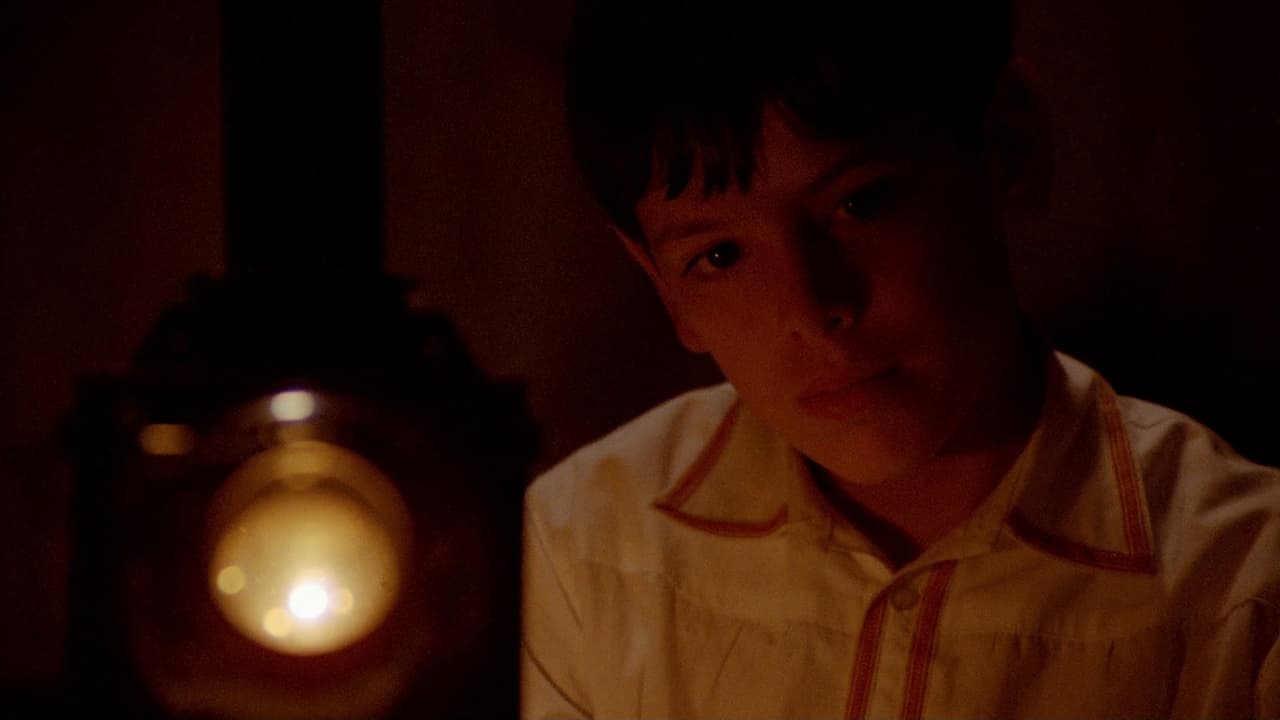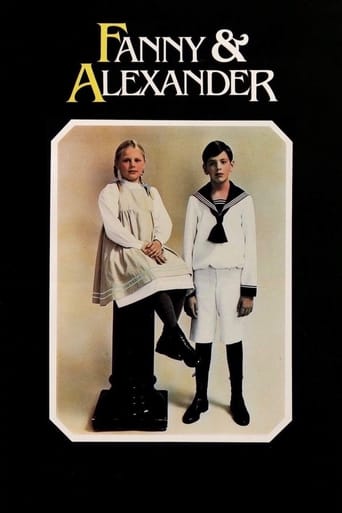

It may sound strange, but my advice is to see the shorter version first in order to fully appreciate this. Being a "love it or hate it" type of movie, only then you can decide whether the longer version is worthy of your time or not. I've seen the shorter version first and it left me hungry; it clearly feels rushed and incomplete; there are many moments that don't seem to interconnect very well. I admit, the cutting could have been done better for the shorter version; it feels too abrupt and affects the overall pacing. Nevertheless, it fueled my interest for the four-part miniseries; I wanted more details! Just as I anticipated, the longer version is clearly superior because of the extraordinary character development and the inclusion of many key scenes. It really feels that Bergman gave the very best of him and "squeezed" all his inspiration into the making of this movie. Everything here is extremely colorful and rich-textured. Indeed, the cinematography and dialogues (especially monologue scenes) are very reminiscent of the works of Andrei Tarkovsky. I must add that there are many semi-horror moments throughout the movie.
... View MoreIngmar Bergman's 1983 classic has been heralded by many as one of the greatest films of all time, and definitely the best to come out of Sweden. The sets and overall theatricality of the film are mesmerizing to look at and the direction is second to none. However, Fanny and Alexander is a film that is beautiful to look at, but almost a bore to listen and think about as it trudges its way through so many different stories that it becomes hypnotizing to watch. While titled Fanny and Alexander, the film mainly centers on the large and wealthy Ekdahl family. The family comprises of the matriarch, Helena, and her three sons, Gustav Adolf, Carl, and Oscar. All three have wives, but Oscar has the most beautiful, Emilie, and two children, Fanny and Alexander. We watch, mostly through the children, as their lives unfold and how they interact with each other as they experience both joy and tragedy.The film is very slow and meticulous with its 188-minute runtime (312 if you watch the miniseries), drawing out every detail and giving us a look at each individual family members personal life. While this does allow for great character development and chemistry, it hurts the film overall as too many details are covered for you to remember or end up caring about by the end. There is also a wild plot shift by the end of the film where spirits and different realities come into play. Bergman is famous for included mystical elements into what seem normal films, but here he should have abandoned that idea as it confuses the audience about what is really going on. For what it lacks in writing, Fanny and Alexander redeems itself in directing and production. This is by far one of the best decorated and positioned films ever made. The sets are all grand in scale and everything is put in exactly the right spot. The elegance of the house shines brightly and makes you want to pause multiple times just to look at everything in the frame. Bergman guides us through his film with such ease that it makes you wonder how a single man could plan and execute all of this. With this being his final feature film, it feels fitting for him to end here by doing what he does best. The cinematography is astounding as we see the beauty of Sweden during all seasons. The winter landscapes, while cold and dreary, still produce a sense of wonder. The summer months give off the essence of life as the frame is filled with lush trees and the occasional sighting of wildlife.Complimenting the production is great acting by the adults, especially Gunn Wallgren as Helena. She plays her character with such warmth and caring and is the best part of the film. The interactions she shares with her family will surely make you remember someone in your life just like her.Another great performance comes from Ewa Fröling as Emilie. She plays one of the most important and well-developed characters in the film. She goes through a roller coaster of emotions as events play out that change her life as well as her children's futures. Near the very end of the film, she shares a passionate scene with Wallgren that perfectly caps off her journey as a mother. The child actors that play the titular leads don't fare so well when it comes to making their characters interesting. They mostly act dormant in most scenes and make you wonder if they will ever do something worth noticing. For a film titled Fanny and Alexander, the characters of Fanny and Alexander are the least compelling to watch or care about.Fanny and Alexander is a film that should be watched by film lovers purely because of its amazing production, cinematography, and directing. But for the casual fan who is looking to see an epic tale, be ready for a long sit for a payoff that never gets close to reaching its potential.
... View MoreScenes from the Ekdahl Saga. The last time I tried this epic I must have abandoned it after the prologue, because all I remember was the off- putting flatulence, which had stayed with me ever since. This time I made it through the full five hours, spread over two evenings, and I'm sad to say the result is an unsatisfied sense of emptiness.This is a very peculiar, confessional sort of performance, and I wish I could compare it with the three hour version. I should like to know what was cut out. It gives an impression of having been put together in a haphazard, arbitrary manner, as if the auteur couldn't decide what he wanted to say. A collection of family photographs dis-arranged in half a dozen old albums.The unfolding events are loaned some significance by the marked Shakespearian backbone. In what is evidently a semi-autobiographical account, Bergman/Alexander is given two, if not three, fathers: his actor-manager Hamlet-type ghost father, and his odious Claudius-type ersatz father, presumably modelled on his real, Puritanical father. This person's malignant ghost was also still around after his convenient demise by fire, plot-wise, apparently arranged by witchcraft. An Oedipal twist. The faded pageant of the Ekdahl theatrical family is definitely insubstantial, occasionally full of sound and fury, but basically of negligible meaning in the wider world. Could that be the film's message ? Its nearest Bergman relative is The Face (aka the Magician), a mysteriously underrated effort which was rejected for its Oscar nomination, but is one of the Swede's best, at least as good as The Seventh Seal. There is a lot of talk about masks in Fanny and Alexander, reminiscent of William's opinion that all the world is a stage. But Greek to many of us. After Shakespeare come Ibsen and Strindberg. Another kettle of fish.Two episodes puzzled me more than the rest, and I wonder if they were cut out of the three-hour version, or at least cut down. One is that in the Epilogue we are shown two babies, looking as if they were identical twins, side by side in closely juxtaposed cots, and identical baby trappings. Looked at from the other side, however, the cots are shown as distinctly separated, and Jarl Kulle, in his barmy emotional speech, only addresses his by-blow with his lame maid, whom for some reason he wants to set up in a coffee-shop, whereas she wants to run a milliner's of sorts. The other baby, nameless, must be Emilie's, by the bishop. Query ? It's a complete riddle to me why we are told any of this.The second peculiar event is the hysterical anti-semitic spasm, and most of the fifth act, which affects the repellent bishop, who parades as Fanny and Alexander's uncle/father, and then gets his just deserts. We learn that time and space do not exist, the universe is expanding, and there is obviously no method in the madness of the gloomy Scandinavian, in spite of the usurper's death.I can't say it was tedious, since I watched it all the way through, wondering what was going to happen next, but just felt disappointed at the end. The answer was that there was no answer to any of the mysteries. Why did Alexander have such unusually large ears ? How does a bishop accumulate debts great enough to bring him to bankruptcy ? Why was Ismael a woman ?
... View MoreA very broad story for Bergman, "Fanny & Alexander" contains a load of interesting themes and ideas, ranging from religion to sexuality to aging and the difficulty of growing up. It's visual style glows in warm tones of red, and the cavalcade of characters is diverse, with some nicely applied magical realism to spice things up even further.I did feel that the film kept the viewer at too great a distance to its characters, which are left a bit thin and vague for my taste. Could this be due to the alleged autobiographical components? Furthermore, I felt that the storytelling wasn't as tight or sharply directed as in Bergman's best masterpieces.
... View More